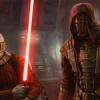A masterful marriage of systems and narrative, Bioware’s Mass Effect 2 cleverly integrates themes of immediacy, resurrection, redemption, and lost time across several small stories involving a colorful cast of characters. It’s the game that Mass Effect wanted to be, and the game that Mass Effect 3 should have been; it’s a remarkable improvement in every way from its predecessor and a strikingly powerful foundation for its successor. It’s unequivocally solid and unquestionably enjoyable, and goddamn is it ever fun to play.
 Its cold opening takes place on the Normandy, during a routine mission on a Geth sweep. Quickly, an unidentified ship shows up on the Normandy’s radar systems. The crew doesn’t know what it is, but by the time your pilot, Joker, realizes what it’s there to do, you’re under attack. Fire blankets the vessel, and the crew is under assault, and one of the crew members rushes to tell Commander Shepard that Joker is refusing to leave. Shepard reassures the young recruit that they will get Joker to safety. In doing so, they’re blasted into space with a faulty suit, drifting into the warm light of an alien star as the opening title comes into view.
Its cold opening takes place on the Normandy, during a routine mission on a Geth sweep. Quickly, an unidentified ship shows up on the Normandy’s radar systems. The crew doesn’t know what it is, but by the time your pilot, Joker, realizes what it’s there to do, you’re under attack. Fire blankets the vessel, and the crew is under assault, and one of the crew members rushes to tell Commander Shepard that Joker is refusing to leave. Shepard reassures the young recruit that they will get Joker to safety. In doing so, they’re blasted into space with a faulty suit, drifting into the warm light of an alien star as the opening title comes into view.
It’s quick, it’s meaty, and it’s unrepentantly fierce.
Mass Effect 2 takes place two years after that cold opening, with Shepard waking up in a cold, unknown facility under attack by a rogue security system. A woman named Miranda on the telecom urges Shepard to get to safety at the docking station, and along the way Shepard is introduced to another team member: Jacob. After escaping the ship, Shepard is sent to another facility whereupon he or she is introduced to the Illusive Man, a cigar-loving, whiskey-sipping, well-dressed space tycoon with LED eyes and a calming voice that belies his unnerving confidence. He’s the leader of Cerberus, a rogue black ops group from the first Mass Effect that crossed paths with Shepard before.
His words are resounding and terse: “We’re at war.”
Human colonies on the fringes of the Terminus Systems are under attack, besieged by a mysterious force known as the Collectors. Despite kidnapping entire colonies, nobody knows how the Collectors are pulling it off, and the Illusive Man explains that he spent an astronomical amount of money to bring back Shepard, the first and only successful product of Project Lazarus.
Since Cerberus is the only organization making any effort to investigate the missing human colonies, the two become allies. The Illusive Man gives Shepard a simple, grand assignment: find and assemble a team of bad-asses from across the galaxy to carry out the ultimate special ops mission, against suicidal odds. And that basic premise is something that Mass Effect 2 accomplishes very, very well.
Mechanically, it’s very different from Mass Effect. Mass Effect 2 lays the groundwork for the third game, moving in a much faster and more focused direction than its predecessor. Guns are louder, hit harder, adopt an ammo system, and are structured by loadouts rather than by Knights of the Old Republic-style inventory classes. Here, there’s only one Kassa Locust, only one Avenger, and only one Carnifex Hand Cannon. Rather than the random drops of the original, this ensures that you’re able to focus upon more strategic builds and combinations, instead of trying to find the perfect gun with the right stats.
Additionally, changes made to character advancement allow each class to be more unique: whether it’s the rushdown-heavy Vanguard, the sneaky Infiltrator, or the tank-like Soldier, each build is crafted to suit play styles better than ever. Weapons are also now class-specific, whereas in the first game any class could use any firearm.
Transitioning from Mass Effect to Mass Effect 2, this is more of a forward-thinking tradeoff than a disadvantage. Ultimately it’s not a perfect transition - stifling creativity - but it’s still a welcome change from the fiddly inventory management which plagued the first game. Everything feels more powerful: weapons are decidedly more tactical, and the choices available to you, while smaller in number, fulfill specific roles and niches that allow you to build a balanced team and the roles they play in your group.
It’s easy to get lost, yet remain enamored by the complexity in the structuring and systems of Mass Effect 2. Its end goal and constant yammering of the final mission’s suicidal odds are simple enough to understand, but because there are so many pieces that need to be properly coordinated to mitigate those suicidal odds, you get an idea of the ground level work associated with it. In Mass Effect, there was no sense of suicidal odds as you traverse the galaxy, trying to find more information on Saren; in Mass Effect 3, the odds are very clear and real, and the persistent pressure that the Reaper war brings with it permeates every fiber of the game’s being.
But Mass Effect 2 is somewhat different: it’s a decidedly more personal story, where the suicide mission is the functional end goal upon which all players will converge, but its character tales are where their experiences will widely differ. In Mass Effect, the stories of Kaidan’s upbringing and Ashley’s religiosity pepper the galaxy, but they don’t define much about its institutions, its characters, or its forces beyond what Kaidan and Ashley interpret them to be. Where Mass Effect looked outwards, towards the universe that Bioware had created, its sequel instead looks to within - crafting nuanced characters instead of worlds, personal histories instead of detailed lore.
In Mass Effect 2, we can experience these stories as they take center stage: Mordin’s work on the Genophage eats away at him, but it also hurts - in a microcosmic, personal way - the very species he reasoned he was saving; Jack’s suffering and torture reverberates throughout the galaxy as the lost children of Cerberus’ experiments find themselves unable to move on; Garrus’ quest for revenge threatens to turn his idea of justice into drunken, toxic vigilantism.
These ideas are even more profound because of the nature of the mission: everyone knows they’re likely going to die, so the game’s persistent fatalism rejigs every team member’s sense of finality to be something close and imminent. By doing so, we experience Thane’s regrets, Jacob’s unease, and Samara’s shame, instead of just hearing about them. It gives their needs and experiences proximity because it frames all of these concerns as last wishes, not as character drama. Everyone has fear and regret, and this surfaces and becomes magnified when they believe they’re going to die. It’s a clever and natural push to prying open these characters so we can reveal their thoughts, needs, and concerns. They want to talk about it, because later on they might not have the chance.
Behind all these serialized tales is the overarching plot itself, a simple investigative tale that throws Shepard and the Normandy into new and distinctly alien places. Whereas Mass Effect neuters any sense of animosity by showing the other races as citizenry and members of racial and ethnic identity, Mass Effect 2 revives old 1950s and 60s alien invasion imagery through the Collectors. Drone-like and enigmatic, the Collectors shed themselves of any empathy and understanding through their callousness, their tight-lipped nature, and the swiftness and finesse of their raids. Lacking destruction, incompetence, and communication, the Collectors are the galaxy’s fearsome apex predators, departing as quickly as they arrive, leaving behind devastation in their wake.
They’re not complex, but they don’t really need to be: it’s clear from the beginning that the Collectors are supposed to be agents of the Reapers, and any experiences we have with them are meant to reinforce this fearsome awe of their mechanical masters. As a villain, the Collectors work perfectly, and any additional complexity can muddy the very real threat they pose.
Ultimately, the experience is about the suicide mission. Bioware skilfully merges ludo-narrative components together in such a way that it’s not really replicated in Mass Effect 3. If you recall our Mass Effect 3 review, one of the issues with the results is ownership: how you succeed or fail is on such a wide gradient that some choices aren’t as meaningful or lack the meanings it suggests. Here, the suicide mission changes and ebbs accordingly to your decisions, both leading to and during the mission itself.
Sometimes, games give the illusion of choice: Dragon Age is notorious for failing to clearly define causality in the choices between Dragon Age: Origins and Dragon Age 2. Other times, choice can be immensely effective - fail to save Oakfield from marauders during a side quest in Fable 2, and the town becomes a graveyard. Mass Effect 2’s choices are internal: the characters you side with, whether you help them with their last wishes, and whether you lead your squads effectively are all factors in determining whether the suicide mission is a success and who survives.
Since the game has so many variables, it creates an ultimately satisfying ending with an immense sense of ownership: it’s your success, your failure, and your suicide mission. For that reason, playing Mass Effect 2 for the first time  without a guide is a hard-to-replicate experience. It’s a culmination of all your interpretations and beliefs, teasing you at every corner to make the right decision, but leaving the definition of right and wrong down you. Though there is an ideal outcome to be achieved, Bioware balances its suboptimal endings fairly well.
without a guide is a hard-to-replicate experience. It’s a culmination of all your interpretations and beliefs, teasing you at every corner to make the right decision, but leaving the definition of right and wrong down you. Though there is an ideal outcome to be achieved, Bioware balances its suboptimal endings fairly well.
It’s actually quite difficult to find meaningful flaws in Mass Effect 2. Since so much of the game is shined to a mirror polish, any sort of slight seems deflected by how well everything else is constructed. Regardless, there are nuisances in the game that can - though temporarily - detract from the experience.
One of them is planet scanning. Since Mass Effect 2 removes the ability to scout certain planets (unless there is an associated quest), each planet is a repository of several mineral types upon which the player can then choose to devote on upgrading squad members, Shepard, and / or the Normandy. However, it’s somewhat superfluous: resources are just a different way to falsely replicate scarcity, but there’s so much of them out there that such scarcity is quickly eliminated by mining only rich planets.
Keeping a universal system such as credits for upgrading would have been better: Bioware could have implemented real scarcity by ensuring that a financial dilemma between upgrading members, Shepard, and the Normandy are zero-sum rather than positive sum. At this stage, sending out drones to mine planets in odd frontier monopoly fashion seems out of touch for Shepard, especially since he or she is supposed to be working for an organization with such a vast amount of resources that bringing people back from the dead isn’t an issue. Additionally, some of the upgrade costs seem arbitrary; some cost credits, whereas others cost Palladium, Element Zero, or what-have-you.
Another minor issue is the game’s persistent fixation with replicating charisma. The game tries hard to paint each team member as complex beings, each of them with their own worries, goals, and motives; but their loyalty is attained by simply completing a mission, and the balance associated with speaking to each team member and understanding their desires isn’t there.
In fact, while these scenarios are rare, they’re somewhat antithetical to the choose-your-own-adventure ethos of the series. Nowhere is this more noticeable than in the arguments between characters. In every instance, achieving the optimal outcome requires that you have a significant majority of Paragon or Renegade points relative to your minor score. If you’ve been a Shepard that closely reflects your personal values over that of a distinctly Paragon or Renegade-heavy character, then you risk a suboptimal suicide mission through no major fault of your own.
We understand that Shepard needs to be charismatic and a team leader for the suicide mission to work, but it’s a profoundness and cleverness that isn’t really needed. Making the right decisions can already be replicated in choosing the right person or making the right speech, and the suicide mission has many of those components already. Conflict resolution is a good visual indicator of Shepard’s ability to keep a team together, but because he or she’s already solving their problems and keeping them on the Normandy in one piece, that charisma seems somewhat ipso facto. At the end of the day, finding the “best” answer usually requires traveling down a specific Paragon or Renegade path, ultimately limiting your choice.
Another missed opportunity comes in the form of Shepard’s temporary allegiance to Cerberus. Mass Effect 2 is quick and eager to tell the player that Shepard has been abandoned, that he or she no longer has any reason to stay with the Alliance. As a result, some characters will sever their ties with you, and there’s no option to convince them otherwise.
However, despite that persistent truth, there’s no major conflict that arises out of it. In the DLC, Admiral Hackett remains trusting of Shepard, and Shepard is more than willing to return to Earth to stand trial after the events in Arrival. Though the relationship between Shepard and the Alliance is not a dominant theme, lost time certainly is: we know that Shepard’s been out for two years, people have moved on, and things have changed. But the ultimate indicator of change could have been most profound on an institutional level, where Shepard’s last saving grace of his or her old life is no longer a trustworthy ally.
Instead, as a character in its own right, the Alliance is conspicuously absent. The game refers to its policies, and Admiral Hackett and David Anderson are in frequent contact with Shepard, but there’s no real sense of animosity between Cerberus and the Alliance that forces you to make a choice. In a game that stresses decisions, having one where they must choose whether to trust in Cerberus or return to the Alliance is one that could have made for some phenomenal internal narrative, pushing home the sense of sacrifice and change.
Yet it doesn’t happen: it teases us throughout the story, here and there implying that Shepard can do the “right” thing or the “wrong” thing, but there’s no explosive element to that relationship. For all intents and purposes, Shepard remains distinctly encased in a firm, jingoistic war machine no different from the Alliance, and despite the apparent bad blood between the two organizations, both of them are willing to play nice and refus to bring their personal politics into the fray. It all seems too convenient. At one point, a character tries to tempt you into becoming a pirate - abandoning both the Alliance and Cerberus, instead striking out on your own. It’s an offer which hints at Mass Effect 2’s moral potential, but for obvious design and length reasons it’s potential that’s never realized.
But it’s still difficult to fault Mass Effect 2 for that. The story blends of kitsch and bad-assery, romanticizing cowboys in space in its own, dark ways while embracing the seedy underbelly of the galaxy - by moving to the Terminus Systems: a place drenched in racism, division, and paranoia.
Mass Effect 2 is a fast game that stops at the perfect moments to tell the perfect stories, none of them too overbearing to spread past their limits and all of them terse and simple enough to hone in on their messages with efficacy. It eschews a lot of the mysticism and wonder that comes with Mass Effect, instead providing us with a look into the lives in the galaxy that fight, struggle, and in turn kill to remain alive. It’s a series of internal journeys eventually leading to the confidence its people need before they descend into the maw of space hell.








